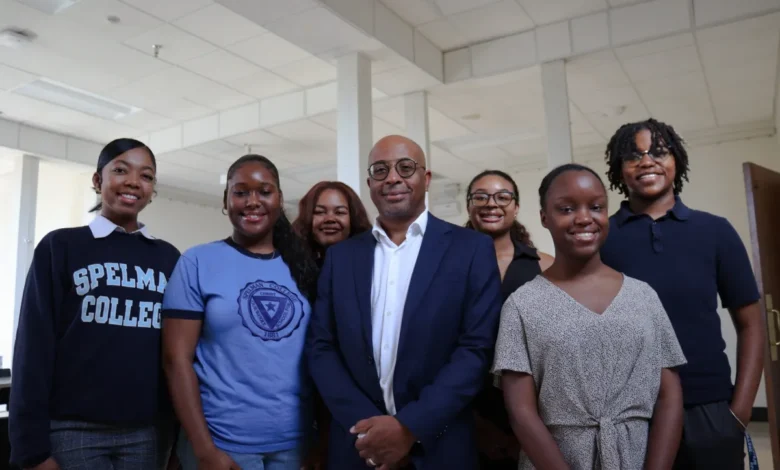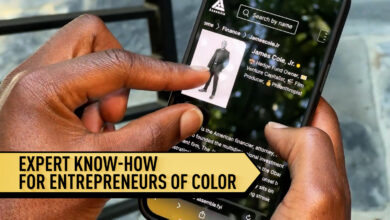Meet the Leader Helping Train Future Black Business Owners

By Bria Overs
Originally appeared in Word in Black
Black people have always had an entrepreneurial spirit. There’s no lack of desire or motivation that stops them from pursuing the path.
According to the most recent official numbers from the U.S. Census Bureau, there are nearly 3.6 million Black-owned businesses. An estimated 1.3 million people are employed by 4% of those companies.
Despite having millions of businesses, there are still long-standing hurdles to entrepreneurship. Lack of access to capital, education, networking, and mentoring opportunities keeps potential founders from taking the steps needed to build something great.
A partnership between the Black Economic Alliance Foundation and two distinguished Historically Black Colleges and Universities seeks to solve this for the next generation of Black entrepreneurs.
Their solution: the Center for Black Entrepreneurship.
Launched in 2021 with a $10 million grant from Bank of America, the CBE builds on Atlanta’s Morehouse College and Spelman College’s respective entrepreneurship programs and initiatives. Since its start, the program has received $5 million from Mastercard’s Impact Fund, $5 million from the Visa Foundation, and $4 million from Cisco.
“Aspirationally, the Center is not just standing up academic programs,” Grant Warner, director of the CBE, tells Word In Black. “It’s ‘How can HBCUs be an economic development engine for their surrounding communities so we can create economic transformation without gentrification?’ Really uplifting our communities, and that has an impact across the board in terms of quality of life and length of life.”
Warner’s resume is extensive, with a background in mechanical engineering and entrepreneurship. He’s led business ventures, including Black Star Technologies, ConnectYard, and XediaLabs.
He spent nearly two decades on the HBCU campus of Howard University, where he was the Director of Innovation, a professor, and initiator of HowU Innovate programming, “an interdisciplinary initiative that provides campus-wide innovation programming in which students are guided through the process of founding technology startups.”
Warner has his finger on the pulse of small businesses and startups. Word In Black spoke with him about the future of the CBE, how to prepare future Black business owners and leaders, and his outlook on the future of Black entrepreneurship.
Bria Overs: This sounds like a large effort to fill a gap that exists around Black entrepreneurship. Both that there aren’t enough Black entrepreneurs, but also the gap in access to pursue entrepreneurship.
Grant Warner: I think that’s absolutely accurate. We completed a study on entrepreneurs who are looking at federal opportunities, but I think the results of it speak largely to the Black experience in entrepreneurship. What you find is things like a lack of access to funding.
You look at things like the SBIR program, which is called America’s Seed Fund, and you look at who’s funded. Oftentimes, it doesn’t look like America. The statistics around Black startups that are funded by venture capital is around 1%. It’s not representative of our slice of the population. There are all dynamics that need to change.
BO: We haven’t seen an investment or this kind of widespread care in Black businesses before. I feel like I’m seeing it for the first time. What makes now so special? Why invest in young Black entrepreneurs and talent at this time?
GW: The “now” part of it was because of George Floyd and the racial reckoning that had everybody step back and look at what they were doing or not doing. It provided a unique opportunity for investments to come into HBCUs, some of which landed in entrepreneurship like we have here.
Most jobs are created by small businesses and startups. That’s just the reality of it. So, if you want to have a thriving U.S. economy, then we have to figure out how we engage larger parts of the society in those activities. That’s just for the health of the country, period.
Given the demographic changes, I think it becomes a national imperative to make sure that we invest in institutions that have been underinvested, in communities that have been underinvested — and create pathways so that people get an education that is tied to opportunities, and those opportunities are tied to dollars so that we can have people who launch ventures who employ people who transform communities.
BO: I would love to talk about the minor in entrepreneurship, as well as the certificate programs going on at Morehouse and Spelman. Can you tell me more about the thinking behind creating those?
GW: The creation of the center really instigated the formation and introduction of the minor. I think the big part of it was really providing an on-ramp for people to participate in entrepreneurship.
It’s really about providing a 21st-century skill set — active partnering, opportunity assessment, risk reduction, experimentation — to our students that they can then leverage however they want. Some will choose to go to a company, some will choose to go and be an entrepreneur, and some will choose to go into academia. But in all of those cases, being able to really understand user needs — do the opportunity identification, experiment with solutions, take feedback, and iterate — all of those are critical skills that you would want to have in those jobs.
Equipping a 21st-century skilled Black workforce and then connecting them with opportunities that allow them to explore entrepreneurship and wealth creation.

BO: One of the issues entrepreneurs have expressed is that they don’t feel supported enough by society as a whole and sometimes by their own community. So what can we all be doing to support entrepreneurs and even the talent coming out of the minor, out of colleges, and the certificate program?
GW: There are a number of different things. When we talk about access to capital, that means a couple of things.
One, it does mean investment. We have institutions that are the leading producers of Black doctors, Black investors, people in finance, etc. Activating them to support and invest in burgeoning Black businesses is important. We need us invested in that asset class to help change the investment targets so that more money goes to Black startups. And I think that will be a virtuous cycle. We’ll have more Black startups that are successful; we’ll have more Black people who have investments that turn a profit.
But the other part is customers. The other way you get capital is through customers. To the extent that there are ventures that are B2C, I think we need to be open as a community. And I think that happens, right? There’s a whole Buy Black initiative, and sites have popped up that really try to aggregate Black vendors. Being conscious about how we spend our dollars will be helpful.
Then, look at the companies we’re working for. What do their supply chains look like right now? Are you making sure your company has a diverse set of suppliers because that’s another access to capital?
There are multiple things to do. But we have to be advocates for ourselves across the board.
BO: You touched on some of the challenges that Black business owners face when they start their own companies. Some of these hurdles come as a surprise to owners. How does the center help prepare students for facing these challenges?
GW: What we try to do is evidence-based action. The reality of it is that as recently as the first half of 2021, 1% of venture funding went to Black people — that’s just the reality. You should be armed with that knowledge. But then, looking under the hood, what drives some of that differentiation? It really is the behavior that investors have when they look at Black companies.
We look at the behavior of venture investors. What you’ll notice is that they tend to scrutinize teams from underrepresented groups, including Black, more heavily, indicating that they don’t believe the facts or statements they’re making.
So when we think about how we go about building curriculum and preparation, we have to take that into account and then arm our students with the knowledge that strengthens them.
BO: As the CBE is going into its second year and the end of your first year as Director, you’ve had some time to see the potential of the Center for Black Entrepreneurship. What does the future look like?
GW: It’s something that we’re actively thinking about now. For example, how we can take some of the curricula, whether it’s the whole thing or modularized, and share it with the HBCU network or the PWI network. Tell them how they might better access students on their campuses and better support Black students.
We’re thinking about bringing additional Black leaders into the ecosystem and then creating digital assets around that interaction. Something that can be shared across HBCUs.
There are also some discussions about how you might instantiate the CBE and other places, but those are all still conversations happening. We’re continuing to build out the program.

BO: My last question is similar to the previous one. What does the future of Black entrepreneurship look like?
GW: It has to be bright because we’re producing new entrants into that market equipped with new skills and relationships that we think will help them be successful. But they’re also entering a landscape that’s very different. A lot of new funds with Black fund managers, and data shows that Black fund managers do invest their money differently.
Again, now the economic landscape has changed a little bit — interest rates, inflation — but I’m hopeful that we reach a state where some of the gains we’ve seen in the past will continue.
At one point, you could count the number of Black people who raised $1 million. If we go back even five years, the number was somewhere around a couple of hundred — ever. Then in 2021 to 2022 and 2023, Black people raised over $1 million, and the average raised was much higher. That number has grown tremendously, so I think the trajectory is there.
We have a bunch of enthusiastic and skilled participants that we’re going to release into the ecosystem. I’m hopeful. And we need it. This is the next civil rights issue. How do we close the wealth gap? This is not something where we can be dejected or something that we can stop. We need to actually attack this and win.




